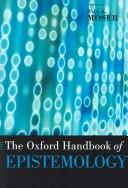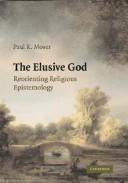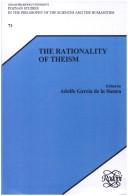| Listing 1 - 8 of 8 |
Sort by
|

ISBN: 0195301706 9780195301700 0198029799 0199892067 019020818X Year: 2005 Publisher: New York ; Oxford : Oxford University Press,
Abstract | Keywords | Export | Availability | Bookmark
 Loading...
Loading...Choose an application
- Reference Manager
- EndNote
- RefWorks (Direct export to RefWorks)
Containing 19 articles by top philosophers on various aspects of the theory of knowledge, this work surveys the field and makes original contributions to contemporary debates.
Knowledge, Theory of. --- Épistémologie --- Théorie de la connaissance --- Acqui 2006 --- Philosophy. --- Épistémologie --- Théorie de la connaissance
Book
ISBN: 9780521736282 9780521516563 9780511817731 9780511691393 0511691394 0511817738 0521516560 0521736285 0511849478 9780511849473 9786612818493 6612818492 0511689918 9780511689918 0511689179 9780511689178 0511690657 9780511690655 110720657X 128281849X 051169251X Year: 2010 Publisher: Cambridge Cambridge University Press
Abstract | Keywords | Export | Availability | Bookmark
 Loading...
Loading...Choose an application
- Reference Manager
- EndNote
- RefWorks (Direct export to RefWorks)
If God exists, where can we find adequate evidence for God's existence? In this book, Paul Moser offers a perspective on the evidence for God that centers on a morally robust version of theism that is cognitively resilient. The resulting evidence for God is not speculative, abstract, or casual. Rather, it is morally and existentially challenging to humans, as they themselves responsively and willingly become evidence of God's reality in receiving and reflecting God's moral character for others. Moser calls this 'personifying evidence of God,' because it requires the evidence to be personified in an intentional agent - such as a human - and thereby to be inherent evidence of an intentional agent. Contrasting this approach with skepticism, scientific naturalism, fideism, and natural theology, Moser also grapples with the potential problems of divine hiddenness, religious diversity, and vast evil.
Knowledge, Theory of (Religion) --- God --- God (Christianity) --- Proof. --- Epistemology, Religious --- Religious epistemology --- Religious knowledge, Theory of --- Religion --- Theology, Doctrinal --- Christianity --- Trinity --- Philosophy --- Arts and Humanities --- God - Proof.
Book
ISBN: 9780521873369 9780521694865 9780511809408 0521873363 0521694868 9780511438509 0511438508 0511809409 1107197961 9781107197961 1281903752 9781281903754 9786611903756 6611903755 0511436386 9780511436383 0511437838 9780511437830 0511435584 9780511435584 0511437161 9780511437168 Year: 2009 Publisher: Cambridge New York Cambridge University Press
Abstract | Keywords | Export | Availability | Bookmark
 Loading...
Loading...Choose an application
- Reference Manager
- EndNote
- RefWorks (Direct export to RefWorks)
What, if anything, does Jesus of Nazareth have to do with philosophy? This question motivates this collection of essays from leading theologians, philosophers, and biblical scholars. Part I portrays Jesus in his first-century intellectual and historical context, attending to intellectual influences and contributions and contemporaneous similar patterns of thought. Part II examines how Jesus influenced two of the most prominent medieval philosophers. It considers the seeming conceptual shift from Hebraic categories of thought to distinctively Greco-Roman ones in later Christian philosophers. Part III considers the significance of Jesus for some prominent contemporary philosophical topics, including epistemology and the meaning of life. The focus is not so much on how 'Christianity' figures in such topics as on how Jesus makes distinctive contributions to them.
Jesus Christ --- -Philosophy. --- Philosophy and religion. --- 232 --- Christianity and philosophy --- Religion and philosophy --- Religion --- Mental philosophy --- Humanities --- Influence. --- Jezus Christus. Christologie: dogmatisch. De Verbo incarnato --- Jesus Christ. --- Christ --- Cristo --- Jezus Chrystus --- Jesus Cristo --- Jesus, --- Jezus --- Christ, Jesus --- Yeh-su --- Masīḥ --- Khristos --- Gesù --- Christo --- Yeshua --- Chrystus --- Gesú Cristo --- Ježíš --- Isa, --- Nabi Isa --- Isa Al-Masih --- Al-Masih, Isa --- Masih, Isa Al --- -Jesus, --- Jesucristo --- Yesu --- Yeh-su Chi-tu --- Iēsous --- Iēsous Christos --- Iēsous, --- Kʻristos --- Hisus Kʻristos --- Christos --- Jesuo --- Yeshuʻa ben Yosef --- Yeshua ben Yoseph --- Iisus --- Iisus Khristos --- Jeschua ben Joseph --- Ieso Kriʻste --- Yesus --- Kristus --- ישו --- ישו הנוצרי --- ישו הנצרי --- ישוע --- ישוע בן יוסף --- المسيح --- مسيح --- يسوع المسيح --- 耶稣 --- 耶稣基督 --- 예수그리스도 --- Jíizis --- Yéshoua --- Iėsu̇s --- Khrist Iėsu̇s --- عيسىٰ --- Philosophy --- Philosophy and religion --- Philosophy. --- عيسىٰ --- Arts and Humanities
Book
ISBN: 9781139151764 9781107023574 9781107615328 9781107314368 1107314364 1139151762 9781299006287 1299006280 1107023572 1107615321 1107301521 1107236045 110730881X 1107254574 1107306612 1107312167 9781107301528 9781107236042 9781107254572 9781107306615 9781107312166 Year: 2013 Publisher: Cambridge Cambridge University Press
Abstract | Keywords | Export | Availability | Bookmark
 Loading...
Loading...Choose an application
- Reference Manager
- EndNote
- RefWorks (Direct export to RefWorks)
This book explores the role of divine severity in the character and wisdom of God, and the flux and difficulties of human life in relation to divine salvation. Much has been written on problems of evil, but the matter of divine severity has received relatively little attention. Paul K. Moser discusses the function of philosophy, evidence and miracles in approaching God. He argues that if God's aim is to extend without coercion His lasting life to humans, then commitment to that goal could manifest itself in making human life severe, for the sake of encouraging humans to enter into that cooperative good life. In this scenario, divine agapē is conferred as free gift, but the human reception of it includes stress and struggle in the face of conflicting powers and priorities. Moser's work will be of great interest to students of the philosophy of religion, and theology.
God (Christianity) --- Philosophical theology --- Philosophy and religion --- Worship --- Cult --- Cultus --- Religion --- Theology, Practical --- Fire-worshipers --- Christianity and philosophy --- Religion and philosophy --- Theology, Philosophical --- Theology, Doctrinal --- Christianity --- Trinity --- Worship. --- Philosophy and religion. --- Philosophical theology. --- Arts and Humanities

ISBN: 1107187575 1281383465 9786611383466 0511397666 0511499019 0511396899 0511399251 0511396163 0511398417 0521889030 052112008X 9780511396892 9780511399251 9780521889032 9780511397660 9780511396168 6611383468 9781107187573 9781281383464 9780511499012 9780511398414 Year: 2008 Publisher: New York Cambridge University Press
Abstract | Keywords | Export | Availability | Bookmark
 Loading...
Loading...Choose an application
- Reference Manager
- EndNote
- RefWorks (Direct export to RefWorks)
Three questions motivate this book's account of evidence for the existence of God. First, if God's existence is hidden, why suppose He exists at all? Second, if God exists, why is He hidden, particularly if God seeks to communicate with people? Third, what are the implications of divine hiddenness for philosophy, theology, and religion's supposed knowledge of God? This book answers these questions using a new account of evidence and knowledge of divine reality that challenges scepticism about God's existence. The central thesis is that we should expect evidence of divine reality to be purposively available to humans, that is, available only in a manner suitable to divine purposes in self-revelation. This lesson generates a seismic shift in our understanding of evidence and knowledge of divine reality. The result is a much-needed reorienting of religious epistemology to accommodate the character and purposes of an authoritative, perfectly loving God.
Knowledge, Theory of (Religion) --- Epistemology, Religious --- Religious epistemology --- Religious knowledge, Theory of --- Religion --- Theology, Doctrinal --- Philosophy --- Arts and Humanities

ISBN: 9042012129 900445778X 1134574878 041526331X 1134574886 1280036508 0203480678 Year: 2003 Publisher: London : Routledge,
Abstract | Keywords | Export | Availability | Bookmark
 Loading...
Loading...Choose an application
- Reference Manager
- EndNote
- RefWorks (Direct export to RefWorks)
This is a controversial collection of brand new papers by some outstanding philosophers and scholars. Its aim is to offer comprehensive theistic replies to the traditional arguments against the existence of God.
Christianity --- Humanism. --- Philosophy and religion. --- Philosophy. --- Theism. --- Teleology.
Book
ISBN: 9780521169790 9781107000605 9781139047395 9781139776233 1139776231 1139047396 9781139779272 1139779273 1107000602 0521169798 1316089231 1139793640 1107254108 1139782266 1283715953 1139777750 Year: 2013 Publisher: Cambridge Cambridge University Press
Abstract | Keywords | Export | Availability | Bookmark
 Loading...
Loading...Choose an application
- Reference Manager
- EndNote
- RefWorks (Direct export to RefWorks)
Although typically separated, philosophy and New Testament theology are mutually beneficial for the understanding of the distinctive wisdom that guides Christian thought and life. The Wisdom of the Christian Faith fills a major gap in the literature on the philosophy of religion. It is the first book on the philosophy of religion to be authored entirely by philosophers while directly engaging themes of wisdom in the Christian tradition. The book consists of all new essays, with contributions from John Cottingham, Paul Gooch, Gordon Graham, John Hare, Michael T. McFall, Paul K. Moser, Andrew Pinsent, Robert Roberts, Charles Taliaferro, William Wainwright, Jerry Walls, Sylvia Walsh, Paul Weithman and Merold Westphal.
Christianity --- Knowledge, Theory of (Religion) --- Philosophical theology --- Wisdom --- 21*01 --- Experience --- Intellect --- Learning and scholarship --- Reason --- Theology, Philosophical --- Philosophy and religion --- Theology, Doctrinal --- 21*01 Godsdienstfilosofie: christelijke religie: filosofisch en rationeel --- Godsdienstfilosofie: christelijke religie: filosofisch en rationeel --- Epistemology, Religious --- Religious epistemology --- Religious knowledge, Theory of --- Religion --- Philosophy --- Bible. --- Epistles of Paul --- Paul, Epistles of --- Paul Sŏsin --- Pauline epistles --- Risālat al-Qiddīs Būlus al-rasūl al-thāniyah ilá Tīmūthīʼūs --- Theology. --- Philosophical theology. --- Wisdom. --- Philosophy. --- Arts and Humanities

ISBN: 1107123399 1280418338 1139147226 051117540X 0511063571 0511057245 0511303963 0511606095 0511072031 9780511063572 9780521803533 0521803535 9780521006101 0521006104 9780511606090 9780511072031 9781280418334 Year: 2002 Publisher: Cambridge, UK New York, NY Cambridge University Press
Abstract | Keywords | Export | Availability | Bookmark
 Loading...
Loading...Choose an application
- Reference Manager
- EndNote
- RefWorks (Direct export to RefWorks)
For many people the existence of God is by no means a sufficiently clear feature of reality. This problem, the fact of divine hiddenness, has been a source of existential concern and has sometimes been taken as a rationale for support of atheism or agnosticism. In this new collection of essays, a distinguished group of philosophers of religion explore the question of divine hiddenness in considerable detail. The issue is approached from several perspectives including Jewish, Christian, atheist and agnostic. There is coverage of the historical treatment of divine hiddenness as found in the work of Maimonides, St. John of the Cross, Jonathan Edwards, Kierkegaard, and various Biblical writers. A substantial introduction clarifies the main problems of and leading solutions to divine hiddenness. Primarily directed at philosophers of religion, theologians, and scholars of religious studies, this collection could also serve as a textbook for upper-level courses in philosophy of religion.
Religion --- Hidden God. --- Deus Absconditus --- God --- God, Hidden --- Silence of God --- Philosophy. --- Absence --- Silence --- Knowableness --- Hidden God --- Philosophy --- Arts and Humanities
| Listing 1 - 8 of 8 |
Sort by
|

 Search
Search Feedback
Feedback About UniCat
About UniCat  Help
Help News
News